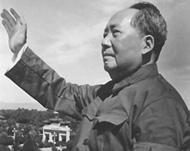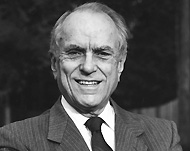Mao and me
Thirty years after the death of Mao Zedong, Sidney Rittenberg, the only American to join the Chinese Communist Party, remembers the man he knew and his legacy for China.

Arriving in China in 1945, Rittenberg became friends with Mao and other Chinese leaders.
Joining the communists when they were in their mountain stronghold of Yanan in northern China, he took part in the resumption of the civil war against the Nationalists of Chiang Kai-Shek.
In the years after the 1949 revolution he remained in China and was imprisoned twice, spending 16 years in solitary confinement.
Aljazeera.net: You knew Mao for many years. What was he like?
Sidney Rittenberg: Firstly, my overwhelming impression of him was he had a giant mind, a giant brain. The reason he was able to dominate his colleagues was his ability to dominate by sheer force of brainpower.
He was certainly a political genius. This has nothing to do with whether he was an evil genius or benign genius but simply the force of mind when you sat and talked with him.
 |
|
Mao: ‘Cold and aloof’ |
Secondly, I would say I never found him a loveable person personally. There were people around him such as Zhou Enlai [future Chinese premier] who were extremely outgoing. With Mao, there was something always cold and aloof about him.
Saturday nights we would get together and play Chinese gin rummy. And while we would be at the table jostling, teasing and cuffing each other around, Mao would only sometimes take part. And nobody teased or cuffed him around. It was just different. You felt that he was not one of the boys.
AJ: What do you think drove him?
SR: I think it was his own ideology in Marxist clothing. Not that he was not a sincere Marxist. But his view of Marxism was to take dialectic materialism and use it to analyse Chinese reality and then develop a Chinese programme.
He had no interest in copying what was done in the Soviet Union or any other country.
|
“He was certainly a political genius” |
In the days before the PRC [People’s Republic of China] it was whether the Chinese revolution would depend on the peasants or urban industrial workers. And the orthodox Soviet line was that Marxism belonged to the proletariat. There was no Marxism in the mountains they used to say. The peasants are backward.
But Mao said when the Party educates the Chinese peasants they could be just as good revolutionaries as anyone else in the world. That was the bedrock of his thinking.
AJ: Mao has been revered across the world. Why, and does he deserve it?
SR: I don’t think he deserves reverence.
I think he deserves acknowledgement as a serious historical leader at a certain period and he needs to be studied, both the good and the bad. And I keep saying this in China.
I was on Chinese Central Television last month and they cut that bit out.
 |
|
After initial successes Mao |
In the years leading up to the revolution he made tremendous contributions to Chinese history, inspired his people, and led them to set up a new regime that cleared out corruption, epidemic diseases, banditry, the warlords, unified the country … and for the first five years carried out tremendous social reform and improved the lives of a great majority of people.
AJ: And then?
SR: And then after 1955-56 the regime started going downhill.
His hubris started coming to the fore and he tried to do more class miracles and things went from bad to worse.
He did good things as a leader that nobody else could do and when he did horrible things he did horrors on a scale nobody else could do either.
AJ: Why?
|
“He was not content with seeing China plod along” |
SR: The main reason is Mao was a very skilled military strategist and tactician so he presided over the strategy from guerrilla warfare to the agrarian reform movement.
He defeated his enemies and he came to power. But he knew very little about administration, economics, or how to run the country.
And I think he was not content with seeing China plod along. He wanted to see China advance to a prominent position in the world during his lifetime and I think he became overly ambitious.
 |
|
Mao meeting Henry Kissinger, |
He said in 1958 at the beginning of the Great Leap Forward that he would use the strategy and tactics of a people’s war and not use the Soviet way of brick upon brick to build the economy.
This was totally unrealistic and resulted in this huge man made famine.
I think it was what went on inside his head that was the problem. His plans during the Great Leap to catch up with Britain and America met with opposition from almost all his sober-minded colleagues. This awoke the conspirator and narrow envious peasant in him. And he began to conspire against his colleagues.
AJ: Can you give an example?
SR: The most vivid thing in my mind was when I first met him in Yanan in the mountains. Apart from a great mind he was the best listener I had seen.
I was an unknown young American who did not know which end was up, and he would listen to my answer as though what I was saying was the most important thing in the world to him.
But later on when I was translating his works in the early 1960s he was quite different. When you sat down and talked with him he did not pay much attention to other people’s views. That was a fundamental change. It’s the old adage about corruption and power.
AJ: You spent 16 years in jail. How did you feel when you were locked up on false charges of being a spy?
 |
|
Rittenberg today works as a |
SR: I was in prison for two different episodes. First in 1949 Stalin accused me of being an American spy.
So I sat in solitary confinement for six years until Stalin died and all those trumped up spy ring cases were thrown out. Mao several times made public apologies and offered to make any kind of restitution that was possible.
And then during the Cultural Revolution I spent another 10 years in solitary.
The first time it was a terrible shock. I felt not angry but hurt. How could they so misunderstand me? How could they not see I was with them and worked hard and supported them?
The second time I knew why I was there. My wife and I had been supporting the young people who had been fighting for a kind of town-hall democracy in China.
And of course it was silly, an illusion, and could not have happened but we put everything we had into it. And they put me back in prison and I knew why.
AJ: How did you spend your time? Where you tortured?
SR: They never physically beat me. In the first four years during the Cultural Revolution when the elite guards ran the prison there was a lot of torturing going on and you could hear the screaming and the blows falling.
But nobody laid a finger on me. For me, there was only mental torture and harassment. The only thing that worried me was I had to keep my health.
When you are faced with a long term in solitary the real danger is you are going to collapse. That is the thing you have to fight against. So you can’t afford to dwell on rage and self-pity.
You have to find ways of dealing positively with your daily life in that little room. So I would get up in the morning and first clean up the cell. Then I took exercises. I developed a kind of callisthenics that didn’t take much room and I would also jog in circles.
The room was only 6.5 feet by 3 feet [2 metres by 1 metre]. After the first year, I had books and could write. I studied hard, like a medieval monk in a cell.
 |
|
Mao’s death sent shockwaves |
AJ: How did you feel when told Mao had died?
SR: It was a strange sensation. I had cried for days when Zhou Enlai died, because I felt I had lost a very dear personal friend, and just when the country needed him.
When Mao died, I felt that this was a much more important loss for the Chinese and, indeed, the world revolution – which at that time I still fervently believed in. A terrible loss!
That being the case – why was it that I couldn’t shed a single tear? I couldn’t understand it. My “emotional intelligence” was much smarter than my “rational intelligence” at that point.
AJ: As someone who has been engaged with China for so long, how do you view the current Sino-US relationship?
SR: If you are reading the congressional journals and what the politicians are fuming about it looks like they will disown China any day. But actually the relationship seems to be quite good and I think our relationship with China for the last four or five presidencies has continually moved forward.
It is not a smooth path, with lots of bumps and challenges and fissures and conflicts and so on. But generally speaking it moves forward and that’s because our national interest in America, and the Chinese national interest, at least in this period of history, doesn’t contain major conflicts that I can see.
I am not a fan of the Bush administration but on their China policy I think I would call it satisfactory. Much better than their relationship with Europe, Latin America or the Middle East. They have been more sensible with China.